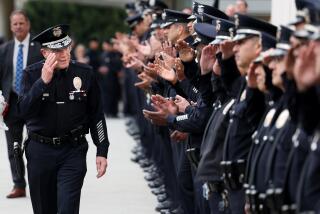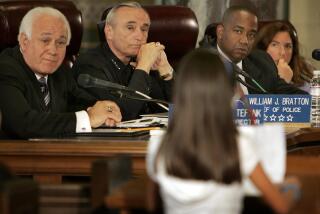Iraqi Police Chief Paid for Friendship With U.S.
LATIFIYAH, Iraq â Ali Karim Abbas was eager for a new Iraq.
Despite being in frail health, the veteran police officer worked with U.S. soldiers to improve security in this rural zone south of Baghdad and was named chief of police this month. âHe always wanted to do the right thing,â said 1st Sgt. Terry Schneider of the 82nd Airborne Division.
Instead, Abbas, a 52-year-old father of eight, became at least the fifth police chief assassinated in cities across Iraq since the fall of Saddam Hussein. A team of killers with a heavy, Russian-made machine gun opened fire on his vehicle Saturday, U.S. authorities said, taking his life and wounding two of his officers.
On the Eid holiday, which marks the end of the holy month of Ramadan and is normally a time for joyous family get-togethers, relatives and friends gathered Tuesday to memorialize Abbas. Hours earlier in Baghdad, U.S. officials said insurgents were shifting their targets to Iraqis as foreign troops become harder to hit.
âIn the past, attacks against coalition forces were predominant,â said L. Paul Bremer III, the chief U.S. civilian administrator in Iraq. âNow terrorist attacks against Iraqis are occurring regularly.â
Abbasâ death was followed about an hour later by the slaying of a well-known Iraqi contractor who had also worked with U.S. forces in the Latifiyah area. Among the contractorâs projects: hiring a local artist to paint murals on the ubiquitous concrete billboards that once displayed Husseinâs image.
âThe attacks against coalition forces have definitely gone down,â Gen. John Abizaid, chief of the U.S. Central Command, said Tuesday in Baghdad. Assaults on U.S. troops have plummeted by half in the past two weeks, from almost 40 a day, the general said. âOur attacks against the enemy have gone up,â Abizaid said. âAttacks against civilians over time [have also] gone up.â
Abbas, a Shiite Muslim, was a native of Mahmudiyah, a large town just north of here. He was one of nine brothers and sisters born to a working-class family that made its living in the townâs sprawling market.
Abbas served as a police officer for 35 years, rising to lieutenant colonel and serving in Baghdad and throughout the country. But, relatives say, he refused to join Husseinâs Baath Party until he was forced to and stayed a low-level, nominal member.
âHe remained a clean man, never defiled by the dirt of the old regime,â said his brother-in-law, Saad Abdul Amir, 38, a headmaster who gathered with other male relatives and friends at the condolence ceremony in a public hall next to a mosque. Abbasâ widow and other women and children assembled at the family home, as is the custom.
This year, Abbas was transferred from Mahmudiyah to Latifiyah, a farming town where lush fields of wheat, corn, date palms and vegetable patches rise from the adjoining valleys of the Tigris and Euphrates rivers.
A survivor of two heart attacks, Abbas directed his energy to fixing the 45-man departmentâs many shortcomings after his promotion to chief.
âWe have many deficiencies here -- no vehicles, little ammunition, bad communications,â said 1st Lt. Hamid Khalaf, sitting Tuesday in Abbasâ office with an autumn chill in the air and a steady rain outside.
Abbas worked closely with the 82nd Airborne, which occupies this zone on the southern fringe of the so-called Sunni Triangle, a district active with anti-coalition cells. Quickly, Abbas and Schneider, a native of Florida, became close comrades.
âWeâd sit in a room together, just him and me, and heâd tell me what he needed,â Schneider recalled, noting that Abbas spoke passable English. âOnce he got everything he needed, he wanted to go out and get the bad guys. He wanted to do joint operations with us.â
The department soon received six new AK-47 rifles, ammunition and shoulder brassards for their identification patches. U.S. forces were working to fix what is now the departmentâs sole vehicle, a Nissan pickup truck pockmarked with bullet holes from a carjacking that claimed two officersâ lives. Police have been calling cabs when they dare to leave their walled compound along the main drag.
âChief Ali had a lot of good ideas,â Schneider said. âHe wanted to accomplish things. He wanted to get things rolling.â
Several other American officers also said they worked closely with Abbas and trusted him. But being a policeman in todayâs Iraq is a perilous enterprise.
Some threats arrive at the station here by telephone; others are written and tossed over the compound walls.
âAnyone who works with the Americans is called a collaborator and risks his life,â said a cousin of Abbas, Shakur Salman, a retired military officer. âEveryone knows this.â
U.S. forces recently arranged for reinforced concrete barriers to be installed in front of the police station to protect against bombings like those that have devastated police facilities in Baghdad and elsewhere.
Several relatives said Abbas recently discovered that insurgents had planted a bomb on a nearby railroad track, and he ordered the device defused.
The end came suddenly for Abbas as he rode in a minivan with the two other policemen.
Abbas was an easy target. He followed a routine, heading home each afternoon to rest and break the Ramadan fast with his family after sunset.
An assailant in a sedan tailed the vehicle and opened fire. Just to be sure, the gunman stepped out and pumped additional rounds into Abbas. In all, he was struck more than a dozen times.
At Tuesdayâs memorial service, a funeral flag named him a martyr. A steady stream of tribal leaders dressed in colorful robes, headdresses and long abayas, or cloaks, shuffled into the hall where the veteran officer was honored.
âMy brother was a man of peace,â said Mohammed Karim Abbas, a 45-year-old merchant who was still in shock about his older brotherâs killing and worried about the future of his siblingâs eight children, two of them developmentally disabled.
âBecause he was an honest man, he has nothing left behind for his family. They have nothing.... We support the Americans. Yes, we are better off than before, we have more freedom. But we all ask: What is freedom without security?â
In Latifiyah, however, there are also those who shed no tears. Questions about Abbas were met with icy stares in shops around the corner from the police station.
âAnyone who works with Americans can expect the same fate,â said a shopkeeper, who, like others, launched into an anti-U.S. tirade and would not give his name. âThis is a normal thing now in Iraq. People are here one day, then they are gone. We hardly think about this as an abnormal occurrence anymore.â
Times staff writer Alissa J. Rubin in Baghdad contributed to this report.
More to Read
Sign up for Essential California
The most important California stories and recommendations in your inbox every morning.
You may occasionally receive promotional content from the Los Angeles Times.










